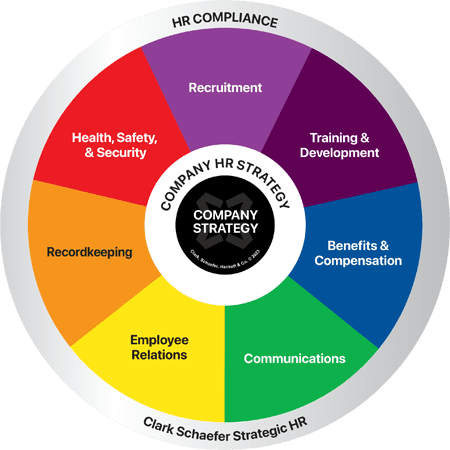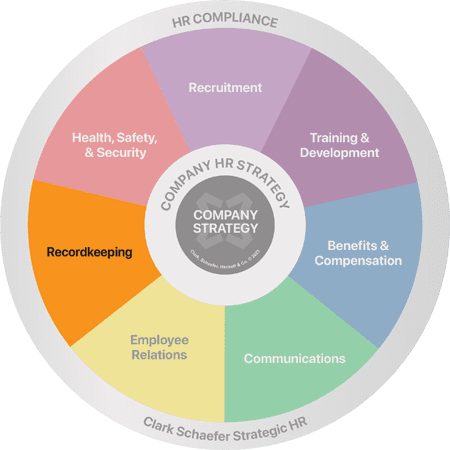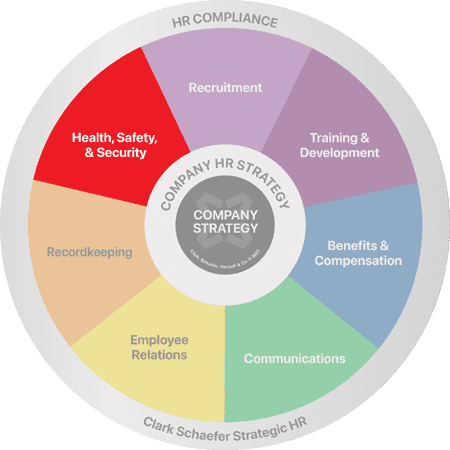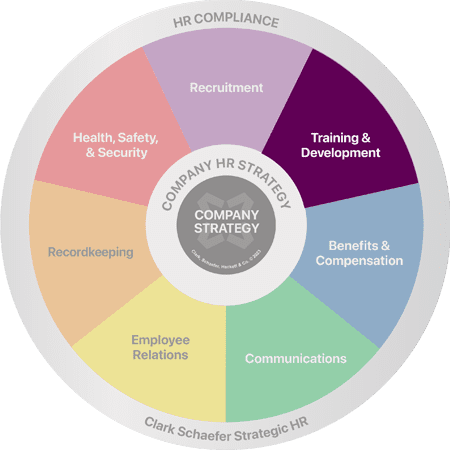Are You Ready For These Top HR Trends in 2024?
Last Updated on January 2, 2024 / HR Strategy

As we transition into a new year, the world of Human Resources is poised to undergo several transformative trends that reflect the evolving landscape of work. Some transformations are already at work, such as the continued integration of technology in HR processes, with the adoption of artificial intelligence (AI), data analytics, and automation tools. These technologies are not only streamlining administrative tasks but also enhancing decision-making processes, enabling HR professionals to focus on more strategic and value-added activities.
Additionally, an emphasis on employee well-being is gaining momentum, with organizations recognizing the importance of creating a positive work environment that promotes mental health, work-life balance, and overall job satisfaction. Our team anticipates that remote and hybrid work arrangements will persist, prompting HR departments to refine policies and practices to accommodate diverse and flexible work setups that continue to support a diverse workforce with varying needs.
And finally, we expect diversity, equity, inclusion, and belonging initiatives will also remain at the forefront of the HR landscape, as companies strive to create more inclusive and equitable workplaces. DE&I efforts go hand in hand with employee well-being and employee satisfaction. As employers work to foster diverse and inclusive workplaces, they are also challenged to be highly transparent in their communications and actions and to build a high level of trust, which leads to employee satisfaction and retention.
So how do we expect to see these HR trends play out in the coming year?
Generative AI & Upskilling
In a June 2023 survey by Gartner, 81% of HR leaders have already begun to explore and implement AI solutions within their organizations, with 52% exploring potential use cases and opportunities for generative AI. Indeed, the Future of Jobs Report 2023 indicates that by 2027, 43% of work tasks will be automated.
The Future of Jobs Report also emphasizes the growing focus on cognitive skills within the workforce – skills like creative and analytical thinking, technology, literacy, and socio-emotional attributes such as curiosity, resilience, and lifelong learning.
Upskilling in the field of human resources is expected to become increasingly important in the coming years and will play out in a variety of ways:
1. Technology Integration
The HR field is becoming more technology-driven with the adoption of complex HRIS (Human Resource Information Systems), AI-driven tools, and data analytics. HR professionals will need to quickly upskill to effectively utilize these technologies and leverage artificial intelligence for HR tasks such as recruitment, employee engagement, and talent management and development.
As HR professionals explore ways to weave AI into their daily operations, it’s also important to understand the ethical and legal concerns of AI adoption.
2. Data-Driven Decision-Making
HR professionals are increasingly relying on data to make informed decisions in areas such as workforce analytics, recruiting, employee performance, and strategic planning – even more so with the rise of AI. Consider providing data analytics training opportunities to help employees successfully engage and understand the results these technologies can provide.
3. Soft Skills and Emotional Intelligence
With the rise of remote work and digital collaboration, the importance of soft skills and emotional intelligence will continue to be sought after. HR professionals need to be adept at interpersonal communication, empathy, and understanding diverse perspectives – especially when so much interpersonal context is lost from behind a screen. Upskilling in these areas will be vital for effective employee relations, conflict resolution, and fostering a positive workplace culture.
4. Continuous Learning Culture
HR professionals should model and promote a culture of continuous learning within organizations. Reevaluating learning and development strategies, assessing training methodologies, and implementing ideal learning technologies will be essential to support the professional as well as personal growth of employees.
In summary, learning to utilize AI in beneficial ways, as well as upskilling across organizations, will create a mix of technical, interpersonal, and leadership skills that help employees adapt to the evolving workplace landscape and allow HR leaders to contribute to the success of organizations in highly valued ways.
Employee Well-Being
Companies are increasingly recognizing the importance of employee well-being. The employee well-being umbrella includes mental health support, work-life balance and remote work initiatives, and wellness programs, in addition to providing meaningful work and opportunities for learning and development. The expectations of employers are growing by the minute!
The top 5 ways employers can support employee well-being in the upcoming year include a combination of physical, mental, and professional support:
1. Flexible Work Arrangements
Offer flexible work hours and remote work options to accommodate diverse employee needs. A flexible work environment allows employees to better balance their professional and personal lives, reducing stress and enhancing overall well-being. To learn more, check out Gallup’s article, “The Future of the Office Has Arrived: It’s Hybrid,” as well as Techopedia’s Remote Work Predictions for 2024.
2. Mental Health Programs and Resources
Prioritize mental health by providing access to counseling services, mental health workshops, and Employee Assistance Programs (EAPs). Promote a culture of openness and destigmatize mental health issues to encourage employees to seek help when needed.
3. Professional Development Opportunities
Invest in employees’ professional growth by offering training programs, workshops, and opportunities for skill development. Providing clear pathways for career advancement and continuous learning not only enhances employees’ job satisfaction but also contributes to their overall well-being.
4. Health and Wellness Initiatives
Implement comprehensive health and wellness programs that address physical well-being. This can include fitness classes, wellness challenges, health screenings, and initiatives that promote a healthy lifestyle. Consider providing wellness benefits such as gym memberships or wellness reimbursements.
5. Regular Check-ins and Feedback
Conduct regular one-on-one check-ins between managers and employees to discuss workloads, career goals, and any challenges they may be facing. Foster open communication and create a supportive environment where employees feel comfortable sharing their concerns.
Check-ins allow for the opportunity to course-correct, as needed, and to ensure that employees have the resources they need to do their jobs successfully. In addition, providing constructive feedback and recognition for accomplishments contribute to a positive work experience.
These strategies collectively address various aspects of employee well-being, creating a holistic approach that considers both personal and professional needs. Employers need to tailor these initiatives based on their workforce’s specific characteristics and preferences, promoting a culture that values and prioritizes the well-being of employees.
Diversity, Equity, Inclusion, and Belonging
Diversity, Equity, Inclusion, and Belonging (DEI&B) initiatives are more than passing HR trends, but rather, essential for creating a workplace that is welcoming, inclusive, and representative of all individuals. In 2024, employers can take several actions to support and enhance their DEI&B efforts:
1. Establish Clear DEI&B Goals and Metrics
Clearly define and communicate DEI&B goals that align with the organization’s values and mission. We recommend using a DEI&B roadmap as you build your diversity initiatives. Establish measurable metrics to track progress and hold the company accountable for achieving diversity, equity, and inclusion objectives. Regularly assess and report on these metrics to demonstrate transparency and commitment.
2. Cultivate an Inclusive Workplace Culture
Foster a culture of inclusivity where all employees feel valued, respected, and heard. Encourage open communication, apply inclusive decision-making principles, and create platforms for employees to share their experiences and perspectives. Implement training programs to raise awareness about unconscious bias, microaggressions, and other barriers to inclusivity.
3. Diverse Hiring Practices
Implement inclusive hiring practices to attract a diverse talent pool. This includes using diverse interview panels, removing bias from job descriptions, and actively seeking candidates from underrepresented groups. Consider partnerships with organizations focused on diversity recruitment and outreach to expand your talent network.
4. Professional Development and Mentorship Programs
Provide opportunities for professional development and mentorship, particularly for employees from underrepresented groups. Establish mentorship programs that connect employees with mentors who can guide and support their career growth. Ensure that these programs are accessible and inclusive.
5. Employee Resource Groups (ERGs)
Establish or enhance Employee Resource Groups that cater to specific communities within the organization. These groups provide a platform for employees to connect, share experiences, and contribute to the development of a more inclusive workplace. Support and actively engage with ERGs to ensure their success and impact.
6. Equitable Policies and Practices
Regularly review and update policies and practices to ensure they are equitable and unbiased. This includes performance evaluation processes, promotions, and compensation structures. Strive to eliminate systemic barriers that may disproportionately affect certain groups within the organization.
DEI&B initiatives require ongoing commitment and effort. Employers should listen to the needs and concerns of their employees, continuously educate themselves and their teams, and adapt their strategies based on feedback and evolving best practices. By taking a comprehensive and proactive approach, employers can contribute to building an inclusive workplace that reflects the diversity of the global workforce.
For ideas to enhance your DEI&B programs, the Society for Human Resource Management (SHRM) offers “4 Ways to Promote Authentic DE&I Practices.”
As we stand on the brink of a new year, the field of Human Resources is on the cusp of significant transformations, mirroring the dynamic nature of the modern workplace. Employers play a pivotal role in steering organizations toward a progressive and thriving future. Recognizing our employees as the cornerstone of success, we can aspire to cultivate environments that prioritize well-being, embrace diversity and inclusion, a new digital world, and adapt to the evolving needs of our workforce.
As we navigate these HR trends and challenges, let us collectively champion a workplace culture that not only reflects the spirit of the times but fosters growth, innovation, and lasting success for individuals and organizations alike.
Thank you to Collen Mahoney, PHR, and Cassie Whitehouse, M.Ed., for contributing to this HR Question of the Week!
Need help tackling your HR Strategy for 2024? Let our team of HR experts assist in building your plans for the new year. Please visit our HR Strategy page to learn more, or simply contact us – we’d love to hear from you.









